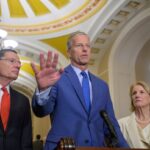
We’re still waiting for the release of the highly anticipated “Twitter File” focusing on Dr. Anthony Fauci, which had been forecast for the end of last week but is taking a little longer to be made public. But before that, another one dropped, this one from independent journalist Alex Berenson.
The irony is rich, because Berenson was “permanently” suspended from Twitter for “repeated violations of our COVID-19 misinformation rules,” and he filed suit against the company in late 2021. Last year, Twitter agreed to a settlement, admitting that it wrongly sanctioned Berenson, and agreed to reinstate his account.
News writer David Thunder still felt the need to qualify any positive statement about Berenson, saying, “The case is politically and legally significant, and worthy of comment, irrespective of what one happens to think of Alex Berenson as an individual or whether one agrees with the specifics of his opinions on COVID vaccines.” Sheesh, this is the same sort of backhanded comment that is so often lobbed at President Donald Trump when someone grudgingly has to admit something positive about him.
As soon as Berenson was reinstated, he reposted the original tweet that got him suspended: “It doesn’t stop infection. Or transmission. Don’t think of it as a vaccine. Think of it — at best — as a therapeutic with a limited window of efficacy and a terrible side effect profile that must be dosed IN ADVANCE OF ILLNESS. And we want to mandate it? Insanity.” This is the kind of opinion that got many medical experts censored on Twitter and other platforms, even though it’s since been shown to be correct.
It’s amusing now to read the pessimistic conclusion of Thunder’s article, written when Elon Musk had announced that he wouldn’t be purchasing Twitter after all. “I hate to be a party pooper,” Thunder wrote, “but sadly, Twitter seems likely to remain a distinctly inhospitable place for free speech for the foreseeable future.” He must’ve celebrated when his prediction turned out to be wrong.
Trending:
Musk acquired Twitter after all, and he’s given Berenson and a handful of others access to the Twitter documents with the go-ahead to use them as they see fit. As Berenson said last week on Substack, “I agree to no conditions on how I will use the information from the files, I can write what I like and do not have to pre-clear anything with Musk or anyone else. I will redact the names of low-level Twitter employees who were not in decision-making roles — I agreed to this condition in my lawsuit discovery, too.”
His look inside Twitter has been quite fruitful.
He spent the first week of January in San Francisco looking at “the company’s records on the government and private pressures it has faced to censor free speech and debate.” He explained that “what Musk is offering is the chance to search Twitter’s systems seeking information about specific topics, in a process akin to discovery in civil lawsuits. Reporters ask for searches. Twitter turns over what it finds to be read or screenshotted at Twitter headquarters but retains the original documents.”
Did the federal government use Twitter to violate Americans’ First Amendment rights?
Yes: 100% (2 Votes)
No: 0% (0 Votes)
What Musk has done is incredibly unusual. “Big companies simply do not open their internal records for outsiders to pour over,” Berenson wrote, no doubt pulling from his own experience suing old Twitter. “Even in litigation, they place confidentiality protection on information they give to plaintiffs’ lawyers.”
He thanked Musk for “making available an unprecedented trove of evidence about government and private efforts to suppress free speech on the most important global platform for journalism. Musk’s decision is not risk-free and has little or no appreciable benefit for him. Everyone — Democrat, Republican or independent — should thank him for doing it.” And we certainly do.
Berenson made the intriguing remark that being there in San Francisco to go through the Twitter Files was “more like BLADE RUNNER every night.”
Looking back at what Matt Taibbi has unearthed, he said, “The files leave little doubt that the FBI actively collaborated with Twitter to suppress Americans’ freedom of speech and push a false narrative that Russia was successfully influencing American elections. The Bureau went so far as to flag individual tweets for removal.”
Berenson was understating the FBI’s involvement. It flagged so many tweets that even the willing accomplices at Twitter had a hard time keeping up. It wasn’t just the FBI, either; numerous government agencies and even members of Congress, such as Adam Schiff of California, pressured Twitter to have individual accounts banned.
As Taibbi tweeted on Jan. 3, “’I APOLOGIZE IN ADVANCE FOR YOUR WORKLOAD’: Requests poured in from FBI offices all over the country, day after day, hour after hour: If Twitter didn’t act quickly, questions came: ‘Was action taken?’ ‘Any movement?’”
Berenson has discovered just how complex this search is.
It dives into a vast tapestry of email; Slack, a corporate messaging system; and Jira, an internal tracking system for more urgent discussions. Federal and state agencies such as the FBI communicated with Twitter through “other, semi-secret channels, which were neither open [nor] disclosed to the public.” The FBI had one called Teleporter, while health agencies used something called the Partner Support Portal. One would assume both the upcoming “Fauci Files” and the Berenson report to follow will have involved a lot of time spent searching that last one.
There were likely other channels as well. And employees used text messages and Signal; “those records are probably gone for good,” Berenson said. Email and Slack databases are held offsite, not at Twitter headquarters, so access must be requested and reasonably tailored, as opposed to open-ended. In that, it’s similar to what he faced during discovery in civil litigation. “Judges will not approve endless rooting through corporate databases,” Berenson said.
He said that what he’d turned up is “fascinating,” adding that it “will make someone very unhappy that Elon opened these files. A couple of someones, but one someone in particular.”
………….
RELATED: By the way, Twitter didn’t just suppress legitimate medical opinions — it also posted “approved” opinions by doctors who weren’t even real!
Fake identities were created using stock photos and made-up quotes, and these fake ER doctors tweeted that they’d lost massive numbers of people every day to the virus. Twitter especially targeted the LGBT community with its fear-mongering. As Revolver reported, this was “an elaborate network of frauds.”
Now that the new GOP Congress has a speaker and can get down to business, it’ll be appointing a “Church”-style committee to investigate the FBI, and certainly one area of exploration will be the bureau’s censoring of critical information prior to the 2020 election — particularly the Hunter Biden laptop story — through Twitter and other social media platforms. The formation of that committee was one of the conditions set by the holdouts on the House vote for speaker.
On Friday evening, before the round of voting that put Kevin McCarthy into the speaker’s chair, Kentucky Rep. Thomas Massie told Tucker Carlson that he would be on that committee.
He said they have a guarantee that they can go wherever the evidence leads them.
The views expressed in this opinion article are those of their author and are not necessarily either shared or endorsed by the owners of this website. If you are interested in contributing an Op-Ed to The Western Journal, you can learn about our submission guidelines and process here.






